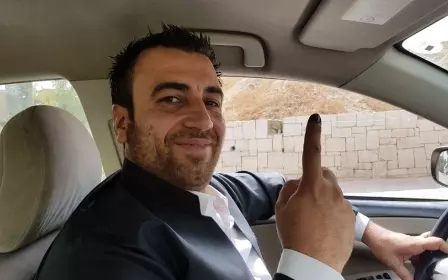'Bye bye Iraq': Erbil celebrates as polls close in Kurdish independence vote

ERBIL, Iraqi Kurdistan - Kurds took to the streets of Erbil as polling closed on 25 September for the referendum on whether Iraqi Kurdistan should become independent.
Music blared, people danced, fireworks were set off and flags were waved from the tops of buildings, cars and trucks in anticipation of what is almost certain to be a "Yes" vote in the referendum.
"Bye bye Iraq! Bye bye Iraq" chanted Kurdish revellers, as crowds gathered near the citadel in central Erbil following the closure of the polls at 7pm local time.
Kurds celebrate in the streets of Erbil (MEE/Alex MacDonald)
“No money, no reform, we want to leave Iraq!" one man, Ayad, told Middle East Eye.
Another said that Iraq had not provided the Kurds with support in the fight against the Islamic State (IS) group.
"When IS came we wanted money and we didn’t get any to fight them," he complained.
The enthusiasm for independence was massive in this city, the primary centre for the Kurdistan Regional Government (KRG).
President Massoud Barzani and Prime Minister Nechirvan Barzani cast their votes early in the day, finally dispelling any rumours that the referendum might be postponed after complaints from Kurdistan's neighbours.
One of the celebrants in Erbil had the word "Yes" shaved into his head. He was unequivocal about the future relationship between Iraq and Kurdistan.
“We are not Iraqi people, we are Kurdish people. We need Kurdistan freedom," he told MEE.
“We are happy here. Iraq is finished," he said, and added an expletive directed at Iraq.
International pressure
Voters were asked to tick yes or no on the ballot asking one question in Kurdish, Turkish, Arabic and Assyrian: "Do you want the Kurdistan region and Kurdistani areas outside the region to become an independent country?"
The referendum was held despite intense international pressure on Barzani to call it off, amid fears that it would spark fresh conflicts with Baghdad and with Iraq's powerful neighbours, Iran and Turkey.
Iran shut its border with Iraqi Kurdistan in response to its independence referendum, the foreign ministry said on Monday.
"At the request of the Iraqi government, we have closed our land and air borders" with Iraqi Kurdistan, said foreign ministry spokesman Bahram Ghasemi, adding that the referendum was "illegal and illegitimate".
As voting progressed, Iraq's parliament ordered Prime Minister Haider al-Abadi to "deploy forces" in areas disputed with the Kurds.
Asked about the risks of armed conflict, Abadi's spokesman Saad al-Hadithi told AFP: "If there are clashes in these zones, it will be the job of federal forces to apply the law."
Karim al-Nuri, a leader with the Badr Brigade, which forms part of the powerful Hashd al-Shaabi paramilitary units, suggested the group was ready to deploy to "Kirkuk and the disputed zones occupied by armed gangs - outlaws who do not respond to the army command".
Kirkuk tensions
Kirkuk, home to Arabs, Kurds and Turkmen, has been a particular point of concern and late on Monday police said a curfew was being imposed in the centre of the city and in Arab and Turkmen areas "to ensure security, monitor the situation and protect the citizens of Kirkuk".
Abadi on Sunday pledged to take all "necessary measures" to protect the country's unity, as his government urged all countries to deal only with it on oil transactions.
The Iraqi Kurds export an average 600,000 barrels per day through a pipeline running through Turkey to Ceyhan on the Mediterranean.
Erdogan on Monday threatened to halt these oil exports, angrily denouncing an "illegitimate" referendum.
Erdogan also said Turkey's Habur border crossing with Iraqi Kurdistan would be closed.
Once more, he urged Iraqi Kurdish authorities to take a step back and appeared to threaten a possible cross-border operation.
"In Iraq, when necessary, we will not shy away from taking these types of steps," Erdogan said, referring to Turkey's military operation launched last year in Syria against IS and Syrian Kurdish militia.
Tehran has also increased pressure, announcing on Sunday it had blocked all flights to and from the region at Baghdad's request.
The foreign ministry in Tehran said its land border with Iraqi Kurdistan remained opened, however, reversing an earlier statement.
Left without a state of their own when the borders of the Middle East were redrawn after World War I, the Kurds see themselves as the world's largest stateless people.
The non-Arab ethnic group number between 25 and 35 million people spread across Iraq, Iran, Turkey and Syria.
- With agencies
This article is available in French on Middle East Eye French edition.
Stay informed with MEE's newsletters
Sign up to get the latest alerts, insights and analysis, starting with Turkey Unpacked
Middle East Eye delivers independent and unrivalled coverage and analysis of the Middle East, North Africa and beyond. To learn more about republishing this content and the associated fees, please fill out this form. More about MEE can be found here.







